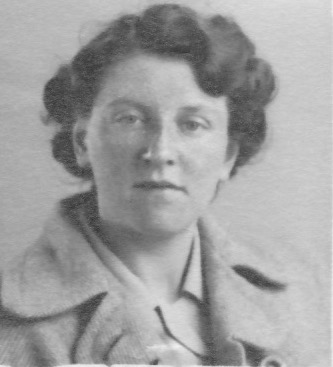
My mother would have been 95 years old on April 15th but she died in October 2009, six months after her 88th birthday. I often think of her – not just on her birthday – but this April, a milestone in more ways than one because it is the 75th anniversary of the Belfast Blitz, an experience Mum never forgot.
In December 2003, when I asked Mum to talk into a tape recorder and share stories about her life, it was obvious the despair and devastation of that night in World War Two had left traumatic memories.
In Easter 1941, Belfast was blitzed and like the incendiary bombs dropped that night, the damage Mum witnessed forever seared in her mind and heart.

As mentioned in a previous post, I researched Korean poetry because I have a new Korean-Japanese student. I discovered a Korean form called Sijo, which has particular syllable rules and a three-line, or six-line, songlike structure.
NaPoWriMo prompts may be by the wayside, but I’ll still make attempts to write poems.
Belfast Blitz a Sijo by Mairi Neil
Lord Haw Haw, delivered his big Easter Eggs as promised
The bombs pounded; buildings collapsed, land mines exploded
Belfast aflame. That destructive April, the people sacrificed.
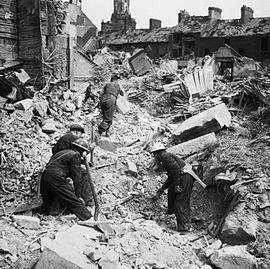
Mum’s Memories:
I joined the army in October 1940 just after Dunkirk, but my eyes took bad. I developed iritis among other problems and the civilian doctor advised me to resign to get my eyes fixed. ‘If you want you can rejoin the ATS but don’t trust army doctors.’
He advised me to take my discharge and the day I received confirmation a rule was passed in parliament about conscripts. However, as a volunteer I was able to get out of the army on medical grounds.
I arrived back in Northern Ireland from Scotland on Good Friday in 1941. I went out to the farm with my brother, Tom and stayed with Uncle Arthur and Aunt Mary at Saintfield.
Everybody was warned to get out of Belfast because Lord Haw Haw had said Hitler was going to give Ulster their Easter eggs. Lord Haw Haw often came on the radio. He talked through his nose and had a distinctive drawl. ‘We’re going to give the people of Ulster their Easter eggs,’ he said.
Well, Belfast emptied – those who could get out. Some of them had to work Saturday. Good Friday wasn’t a holiday in Belfast or Scotland, only in England. But Glasgow and Belfast got Easter Tuesday, so we had Sunday, Monday, and Tuesday off. We were expecting the planes but they never came.
There had been a raid the week before.
The Luftwaffe launched its first attack on Belfast April 7th and 8th. They attacked the docks. That Dockside Raid was a shock. The government thought we were too far away for the Luftwaffe to reach. We’d had 22 air raid siren alerts – each one false – people were careless about the blackout curtains or going to bomb shelters.
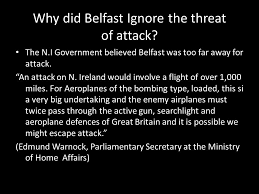
Even London didn’t think we’d be a target and had told Stormont to build air bases. We only had 200 air raid shelters for a population of 500,000. When more than 500 Luftwaffe bombers and escorts took off from northern France – heading for Clydeside and Greenock no one expected eight bombers to veer off to Belfast.
They dropped about 800 incendiary bombs on the dock area. That shook everyone up! Workers lived near the factories and docks, they were sitting ducks. Lots of homes were destroyed. Incendiary bombs set fire to large timber yards. Harland and Wolff dockyards were hit and the Rank Flour Mill. Thirteen people were killed and the Germans discovered how weak our defences were.
However, that Easter weekend we thought we were okay. Everybody returned Tuesday night to start work on Wednesday morning and the beggars came around 11 o’clock Tuesday night.
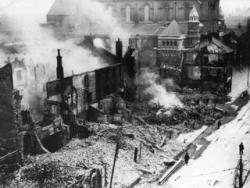
It was one of the longest raids of the war. They started about 10.30pm, actually. The first bomb fell before the sirens went and got the main water line in Royal Avenue coming from the reservoir and shortly after 2.00am they got the other water line so there was no water.
About 150 to 160 Luftwaffe bombers dropped over 200 tons of explosives. They targeted the city’s waterworks. At first we thought that the reflection off the reservoir had fooled the pilots into thinking that they were near the docks. But they were no fools. The waterworks were deliberately hit.
The water pressure was so low fire crews found that their hoses were of little use. It was an inferno. It was fire that damaged Belfast – fire did most of the damage.
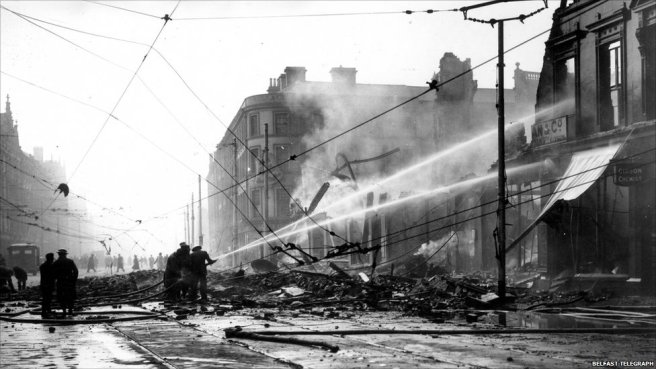
It was after 6.00am before the all clear sounded. In the morning when I first looked out Belfast seemed to be surrounded by fire, there were still blazes burning.
Later people said Dublin had warned the politicians the bombers were on their way. Dublin wasn’t in the war but they wouldn’t do anything against us. I don’t know what we would have done without them because things would have been a darn sight worst.
They could see the fires in Dublin and were asked to help and said we’re sending you up fire engines and tanks of water. They sent up every available fire crew about 70 men and 13 engines and they fought the fires for 3 days without rest. They were relieved by fire crews from the Clyde and Liverpool.
I don’t know what we would have done without those volunteers.
“In the past, and probably in the present, too, a number of them did not see eye to eye with us politically, but they are our people–we are one and the same people–and their sorrows in the present instance are also our sorrows; and I want to say to them that any help we can give to them in the present time we will give to them whole-heartedly, believing that were the circumstances reversed they would also give us their help whole-heartedly …”
Eamon De Valera President of Ireland after the Belfast Blitz.
We were four houses down from the top of our street where a landmine landed. A shop stood alone with little damage but there was nobody in there. Nearby two houses took a direct hit.
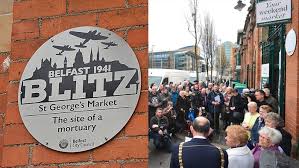
One of the houses was empty but in the middle house two daughters and their mother were killed. The father was a guard in the gaol down the road and the brother was in a granary sheltering with the boys brigade so they were saved. The mother had been across the road visiting but when the siren sounded she saw a tiny light through a crack in the blackout curtains and knew that her daughters were home.
‘Oh, the girls are home I better be with them.’ She rushed out as a landmine fell and the house was demolished. Her body was discovered atop a lamp post and the girls crushed and killed inside their home.
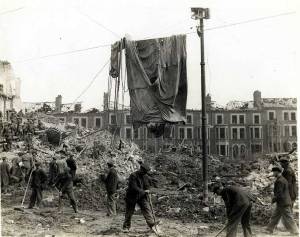
My stepmother went to Comber to her folk and my uncle pleaded with us to stay with them at the farm until Wednesday morning but Tom said, ‘Oh no, my mammy said we had to come home because she was coming home.’
Well, we got home about half past eight or nine o’clock but she never arrived until nearly half past ten. We had to sit on the doorstep because she wouldn’t give us key.
We had just got into bed and the sirens went so of course it was panic stations. We made our way down the stairs, but before we got down they dropped the landmine at the top of the street.
Our two front and back doors blew in and some of the windows shattered although they weren’t too bad because we had sticky tape on them. We had a Yale lock, plus a big ordinary lock on the door and we had a bar across, yet the door was blown in.
We got down below the stairs and huddled together. We never had a back garden and the nearest air raid shelter no one would go in because it was stinking, dogs peed in it and everything else. It wasn’t kept in good repair at all.
The bombing went on until half past six in the morning.
We always sheltered under the stairs. It was a funny thing although houses were bombed it worked out under the stairs was the safest place to be, and many people survived.
I’ll never forget when I came out of the house and looked out. We lived at a bit of a height and the city seemed to be ringed by fire.
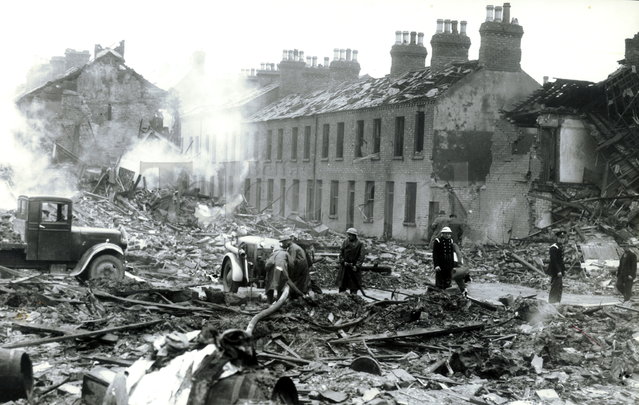
There were unexploded bombs all over the place and this little lad came down the street – he was eleven or twelve years old – and he had some of his belongings over his shoulder wrapped in a sheet that had once been white, but was now dirty grey.
He held a canary in its cage. ‘Were are you from son,’ I said.
‘Oh up from the Bally streets.’
These streets were at the top of the Old Park Road. Four or five streets: Ballyclare, Ballymoney, Ballywalton…Ballymena. They ran to the Clifton Park Road.
Those streets bombed because the Germans were actually aiming for Aldergrove Airfield and the RAF, which was on the other side of the hill called Devil’s Mountain. The RAF boys told us it was easy to confuse from the air because the way the tram lines ran they look like runways and the houses looked like huts.
On one side of the Cliftonville Road was the football ground and the other was the cricket ground so the Germans thought they were bombing the airport but they were on the wrong side of the hill.
The wee boy said, ‘Missus, there’s hardly a house left standing, the Bally streets are flattened.’
‘Oh my goodness,’ I said.
‘I don’t know where my parents are,’ the wee boy cried, ‘they were at the Crumlin Road pictures and they haven’t come back yet.’
‘Where are you going?’
‘I’m making for my aunt’s down the Shore Road, York Street East.’
I often wondered how he got on because that street was badly damaged. I wonder what happened to that wee boy and so many others like him. It was a terrible night. Around 56,000 homes damaged or destroyed. Nearly 1,000 people were killed and 1,500 injured. 400 of those were seriously and 100,000 homeless.
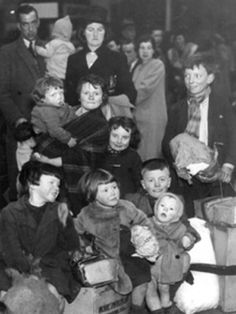
War is ugly. I would hate to see another world war. Australia should never have been in Vietnam and should keep out of other countries. Too many innocent civilians suffer.
Two hospitals were hit that night in Belfast, so bodies were lain out in St. George’s Market to be identified. Some were never identified and were buried in mass graves.
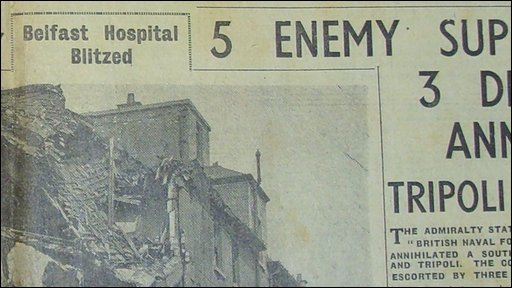
Ronnie Finnegan’s father was the groom at Wilton’s Funeral Parlour and my friend, Mrs Calvert, said she would never forget to her dying day the squeals of the horses.
The hay took a direct hit and they only managed to rescue a couple of the horses because there was no water to fight the fire. They were the most beautiful horses you could ever see.
They were Belgian and kept in beautiful condition. They shone at funerals, coats gleaming. Ronnie said his father never really got over the loss of the horses because they were like his children.
Aunt Martha ran all the way, through streets of unexploded bombs, from Armagh Road to Albertville Drive to plead with us. ‘Please get out to the farm.’
She then went on up to Woodville Road to ask Aunt Minnie to leave. She’d run all that way and was so insistent, we packed to go. Tom had a canary and asked what to do with it.
‘Take it with us,’ I said. We were about ready to leave when the canary died – delayed shock.
Tom was breaking his heart over the bird when my stepmother grabbed it and flushed it down the toilet. She was like that – a heartless woman.
Of course, there was little public transport because lots of the road had been damaged. We walked to a shortcut we knew to see if there were any buses. Passing Mr and Mrs Scott’s place we noticed their boys had come in from their dad’s farm, which was just above our family farm.
The boys had come in to get Mrs Scott because she was a widow. Bob Scott was dead and they had come to evacuate their mother who said, ‘I’m sorry we can’t take you because there’s no room in the car.’
We understood but asked if they could take our bags. ‘Oh aye, we can squeeze them in the boot.’
What a relief to get rid of the luggage because as we walked downhill everywhere was thronging. The smell of burning flesh, clothes, furniture – everything – clung to our nostrils. We managed to get a bus out to the farm and stayed there for most of the war.
I never went back to Belfast until much later because I got a job in Saintfield and worked there until my eyes took really bad and I had to see a specialist who saved my sight.
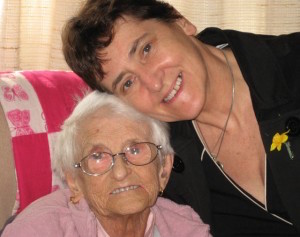
Without Mum, another Sijo
Mairi Neil
Without Mum, the world is sadder
Without Mum, wisdom is diminished
Without Mum, hearts are crushed
Without Mum, life is less appealing
A mother’s love potent and powerful
My mother’s love not broken by death
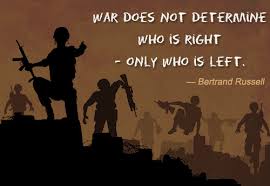

Mairi, this is riveting. It’s a story I’ve never heard before.
LikeLike
Thank you Lisa – I can’t imagine what it must have been like to live through – apparently it lasted longer than any single night of bombing in any of the other Uk cities, including London.
LikeLike
They copped a fair bit in Scotland too, as we found out from the Edinburgh Museum when we visited. But we tend not to hear so much about it.
LikeLike
Ah yes – my hometown Greenock was pasted night after night because of the ships in Clydeside. Some of the city still hadn’t been fixed in the 60s – I remember seeing the blackened walls and empty spaces when we went ‘into town’. A pile of prefabs erected as emergency housing became permanent and as far as I know are still there! My aunt spent 2 years in hospital after being machine-gunned escaping from a bombed air raid shelter. When I visited her in the 70s and they found shrapnel had worked its way into her toe she was so relieved because initially they’d diagnosed gout and as a good Presbyterian non-drinker she was appalled:) Ironically, her daughter married a soldier and they were based in Germany for a couple of years – Aunt Mary said when she visited the first time she kept wondering if any of the men of her age were the ones who’d shot her! Needless to say, she soon relaxed and enjoyed several visits – testimony to our resilience and adaptability and the power of forgiveness. And yet we still keep having wars – goodness knows how long it will take those poor Syrians to rebuild their country – but they will!
LikeLike
What an amazing story, Mairi. A perfect, well researched record of those harrowing times.
LikeLiked by 1 person
Not too much research needed my mother had an amazing memory Glenice – Dad used to laugh when she contradicted him (often:) ) that she remembered what was on the sandwiches in 1948 and they were eaten on a Thursday! But this story is easing me back into writing about Mum – I find it heartbreaking to hear her voice – should have transcribed more of the tapes years ago when she was still alive.
LikeLike
Interesting Mairi, we only hear about London being bombed, never any of the other places. Thanks for the history lesson. You look so much like your mum in the earlier photo, you could be twins!
LikeLike
Thank you for the compliment Kaye – and yes out of all the sisters, I’m more like my Mum – in more ways than one! She loved reading and history and chatting to strangers:) Regarding history, I guess our brains would explode if we knew all the facts about everything but, the history books are selective and governments especially like to push their own narratives. It’s only in the last few years we’re beginning to hear the indigenous side of Australia’s history.
LikeLike
Agree about brains exploding Mairi…how apt – that’s how mine feels right now!
But I disagree about ‘just hearing about our indigenous history’ – it’s always been there (the good, or perhaps I should say the well-intentioned, and the bad) for those who wanted to search it out. But yes, not taught in schools or anything. I can remember thinking as a new high-school student that we should be learning Australian history not British! (It was so boring learning about the Kings and Queens of Britain, etc. ad infinitum.)
LikeLike
As a writer, I didn’t explain myself very well did I? Of course, the indigenous history has always been there but I was meaning that it was taught from a white colonial ‘conqueror’s’ perspective. When I came to Australia in 1962, the School Paper, a compulsory part of the curriculum had a story set in the Australian bush and it referred to ‘little picaninnies’and then only in passing. We are hearing some wonderful Australian voices now like Stan Grant and the list of indigenous authors grows longer each year.
LikeLiked by 1 person